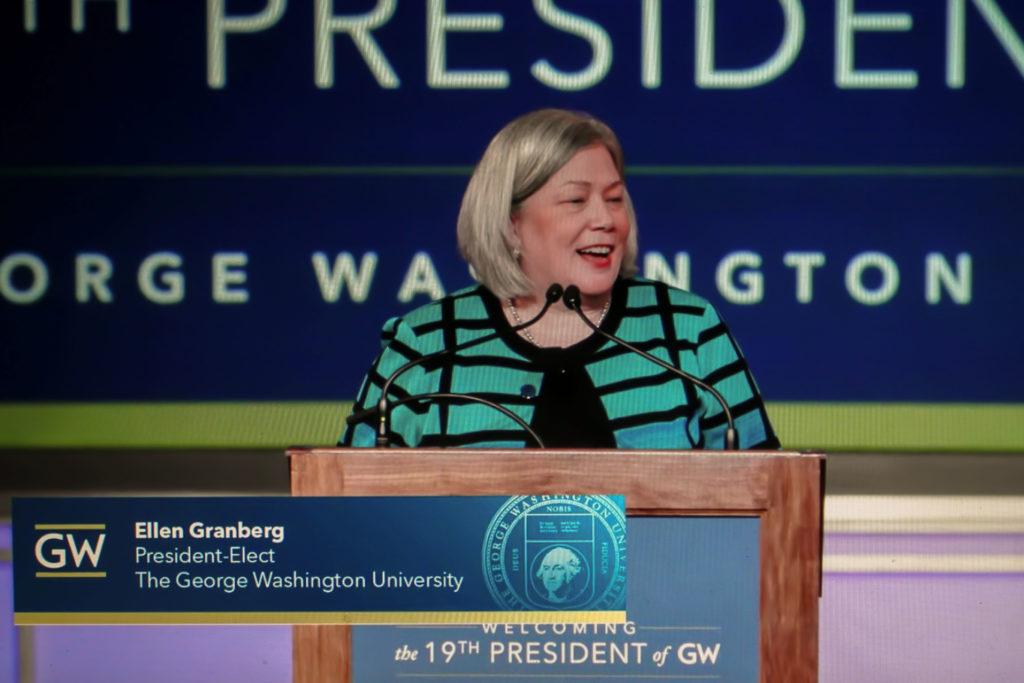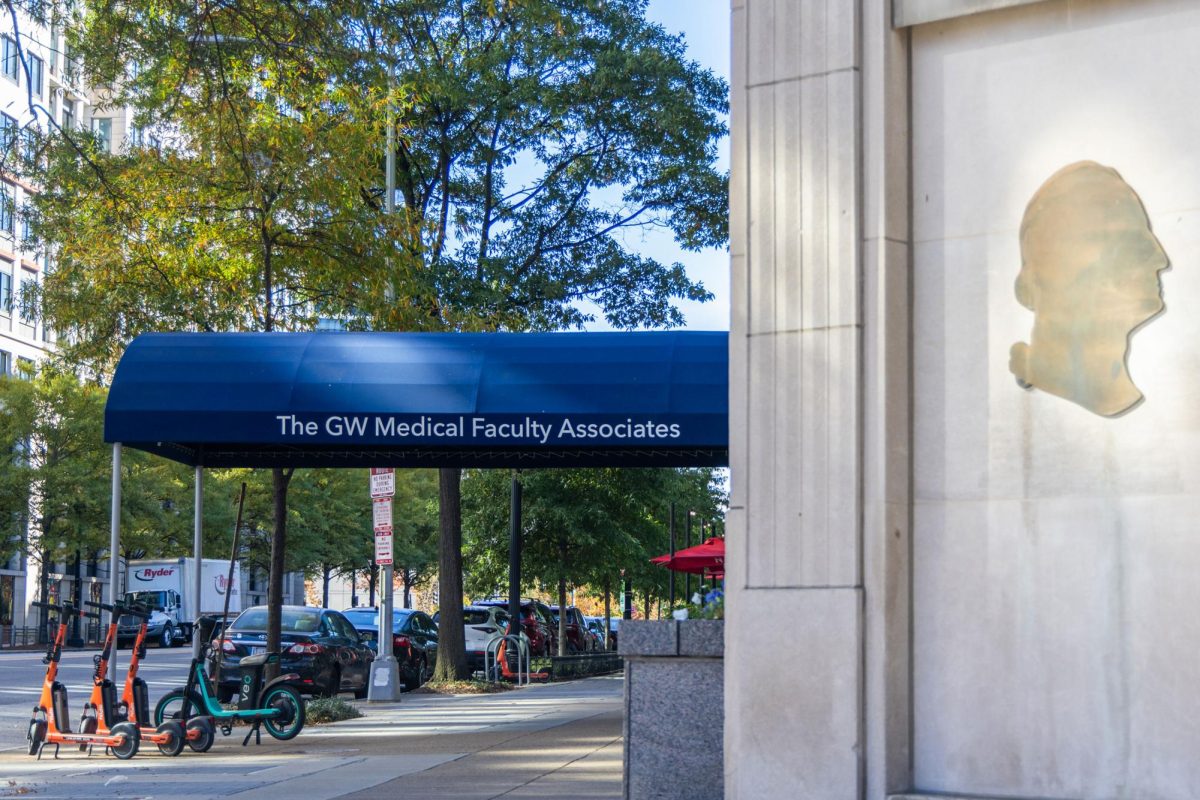Faculty are “optimistic” about the selection of Ellen Granberg as GW’s 19th president, a conclusion to the presidential search process that they said signals a commitment from the Board of Trustees to shared governance.
Officials named Granberg, who serves as the provost and senior vice president for academic affairs at the Rochester Institute of Technology, as the next University president Wednesday following a monthslong presidential search conducted by a 17-member Presidential Search Committee with five faculty members. More than 10 professors said Granberg’s experience in higher education administration gives her the skills to create a strategic plan that unites the GW community and promotes shared governance between the Board, administrators and faculty.
Kim Roddis, a professor of environmental and civil engineering, said Granberg’s decadeslong work in higher education administration demonstrates that she will be able to lead GW’s future strategic planning. Prior to joining Rochester Institute of Technology in 2018, Granberg served as a faculty member, department chair, associate provost for faculty affairs and senior associate provost at Clemson University over the course of two decades, according to her LinkedIn.
GW has lacked a strategic plan since November 2020, when officials labeled former University President Thomas LeBlanc’s five-year plan as “obsolete” due to the COVID-19 pandemic. LeBlanc’s plan, which included an enrollment strategy to increase the number of students majoring in STEM fields by 30 percent and cut undergraduate enrollment by 20 percent, drew backlash from faculty members who said the plan lacked input from the GW community.
“She did a major effort in strategic planning at Clemson and then also some at RIT,” she said. “So she understands the importance of doing it in an inclusive way, that strategic plans are living documents and that we have to keep updating them with how things change.”
Roddis said Granberg’s undergraduate degree in history from the University of California, Davis and her research on the intersection of sociology and health care show that she can navigate and bolster GW’s diverse academic offerings.
Officials announced a set of academic priorities, including academic medicine, equity and social justice, data science and sustainability and climate change in September in the absence of a strategic plan. Some faculty senators said the priorities and investments in the academic medical enterprise demonstrated a continued lack of support from the administration for humanities fields.
“I just feel that she’s somebody that understands the breadth of GW, so I am looking forward to being able to have the diverse parts, all of our little GW quirks that add to our strengths, so we can be the best GW we can be,” she said. “Instead of trying to mimic some other university, we’re going to be the best for us.”
Roddis, who also served as the chair of the Faculty Consultative Committee – a committee of faculty members who advised trustees on the presidential search process, said the search displayed shared governance between faculty, trustees and administrators. She said the Board selected four faculty members from the committee to serve on the Presidential Search Committee after the Faculty Consultative Committee requested they pick at least one of their members.
“The Board reached out, and basically, by picking members off the FCC, they were giving faculty a voice,” she said.
Harald Griesshammer, a professor of physics, said there was a “huge difference” between the community involvement in the presidential searches for Granberg and LeBlanc. He said officials chose Granberg through a more collaborative process that took GW community members’ input into account.
The Presidential Search Committee hosted a series of community forums in September for faculty, staff, alumni and students to share what they wanted to see in the next University president.
“I think people really wanted to make this work and look at the best candidate for the community as a whole and not necessarily look at a designated candidate to get a certain specific agenda done, but really, to bring GW forward,” he said.
Griesshammer said the selection of LeBlanc appeared centered around the desires of trustees, and LeBlanc frequently prioritized what trustees wanted to see in the University over what faculty and students desired throughout his tenure.
Officials ended a partnership with the Disney Institute, the Disney corporation’s professional development company, spearheaded by LeBlanc to improve GW employee culture in light of COVID-19. The partnership received criticism from faculty who thought the initiatives treated GW like a corporation instead of a university.
More than 220 professors and 130 students signed a petition in September 2020, calling on LeBlanc to resign because he “threatened” GW’s “core values.” A slim majority of faculty also stated they did not have confidence in LeBlanc’s leadership in a survey delivered to full-time faculty in February 2021.
“He was somebody who did give the impression that he would listen, but he, I think, largely had his mind made up, and that mind appeared to be exactly what the Board wanted,” he said.
Griesshammer said navigating the financial status of the Medical Faculty Associates will be one of Granberg’s biggest challenges as president. The MFA is currently more than $200 million in debt, and GW CFO Bruno Fernandes estimates it will lose up to $65 million by the end of the current fiscal year, which will derail officials’ plans for the MFA to break even by the end of June.
“We just can’t have a medical enterprise from a deficit,” he said. “No other university does that, so that’s a humongous challenge. And I hope there, she’s really looking at all the advice from all sides.”
Denver Brunsman, an associate professor of history, said Granberg exhibited a desire to listen to faculty members and learn more about the University in her address to GW community members Wednesday.
“It was the combination of great ambition embedded in deep community that inspired me and I hope will inspire all of us as we start GW’s third century together,” Granberg said during her address Wednesday.
Brunsman said making efforts to listen and learn from professors will help her build relationships with faculty members throughout her tenure.
“I think faculty, above all, just want to be part of the governing process of the University, and the different constituencies want to be listened to,” he said. “And she seems, by all accounts, to be a very good listener, so I think that bodes well.”
Alexa Alice Joubin, a professor of English, said she is “excited” by Granberg’s academic and professional background in the social sciences and hopes Granberg’s leadership will lead to more support for social sciences and humanities departments.
“I’m hoping that the University leadership would begin to understand the value of the humanities and render appropriate support appropriate to a school of GW’s stature,” she said.
David Rain, an associate professor of geography and international affairs, said Granberg’s career in higher education administration shows that she is a “firm and compassionate leader” whom the GW community can trust. He said he attended the announcement of Granberg’s presidency Wednesday and saw the “delight” on the faces of Presidential Search Committee members and officials.
“They feel they made the right choice, and I think they’re right,” he said.











